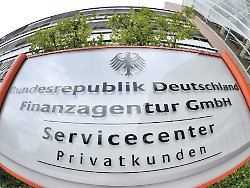The federal government wants to raise gigantic amounts on the market: more than 400 billion euros. That is almost twice as much as planned before the pandemic. The record amount is intended to offset massive tax losses. But investors should also be won over for "green investments".
Due to the Corona crisis, the federal government has to borrow more money from investors this year than ever before. In total, he wants to get around 407 billion euros on the financial market, as the finance agency responsible for debt management announced. At the end of 2019 – before the outbreak of the pandemic – a maximum of 218 billion euros had been targeted.
"It is an unprecedented issue volume due to the extraordinary circumstances," said Finance Agency managing director Tammo Diemer. In the forthcoming fourth quarter alone, the federal government wants to raise EUR 50.5 billion by issuing securities – EUR 6 billion more than originally estimated. In addition, there are around 1.5 billion euros in inflation-linked bonds.
The Corona recession has thrown all federal financial planning upside down. It causes enormous tax losses. At the same time, the government is spending a lot of money to mitigate the economic consequences of the crisis. The emissions are intended to offset the difference between income and expenditure. At the same time, 248 billion euros of old debts have to be repaid.
New green bond in November
After the successful premiere of the first green bond, the federal government plans to add a new product to this area in November. Then the sale of a green bond with a term of five years is planned, said Diemer. The auction is set to flush five billion euros into Finance Minister Olaf Scholz's coffers.
This young segment is to be expanded further in 2021. Diemer is toying with a green bond with a term of 30 years. The federal government sold its first green bond to investors on September 2nd. The issue volume of the paper with a term of ten years was set at 6.5 billion euros. The demand exceeded the supply by a good five times. The papers are "a schnapps more expensive" than conventional bonds. "Investors were ready to forego a little return," said Diemer.
Capital for energy and environmental projects
The collected capital will be allocated to specific energy and environmental projects that will contribute to the sustainable and climate-friendly restructuring of the economy. "Climate protection and environmental protection are the great challenges of our time that we can only face together," said Scholz at the start of the "European Sustainable Finance Summit". "To do this, we have to steer the money in the right direction and give the financial market a lasting impetus."
At the premiere of the first green bond, the finance agency hired investment banks to sell the paper – as it did with two other bond issues this year, for which the banks collected 29 million euros in fees. The decision was made to go this way "because we wanted to safely implement a high volume of issues this year," as Diemer said. Auctions – for which no fees are due – remained the standard procedure.
.
